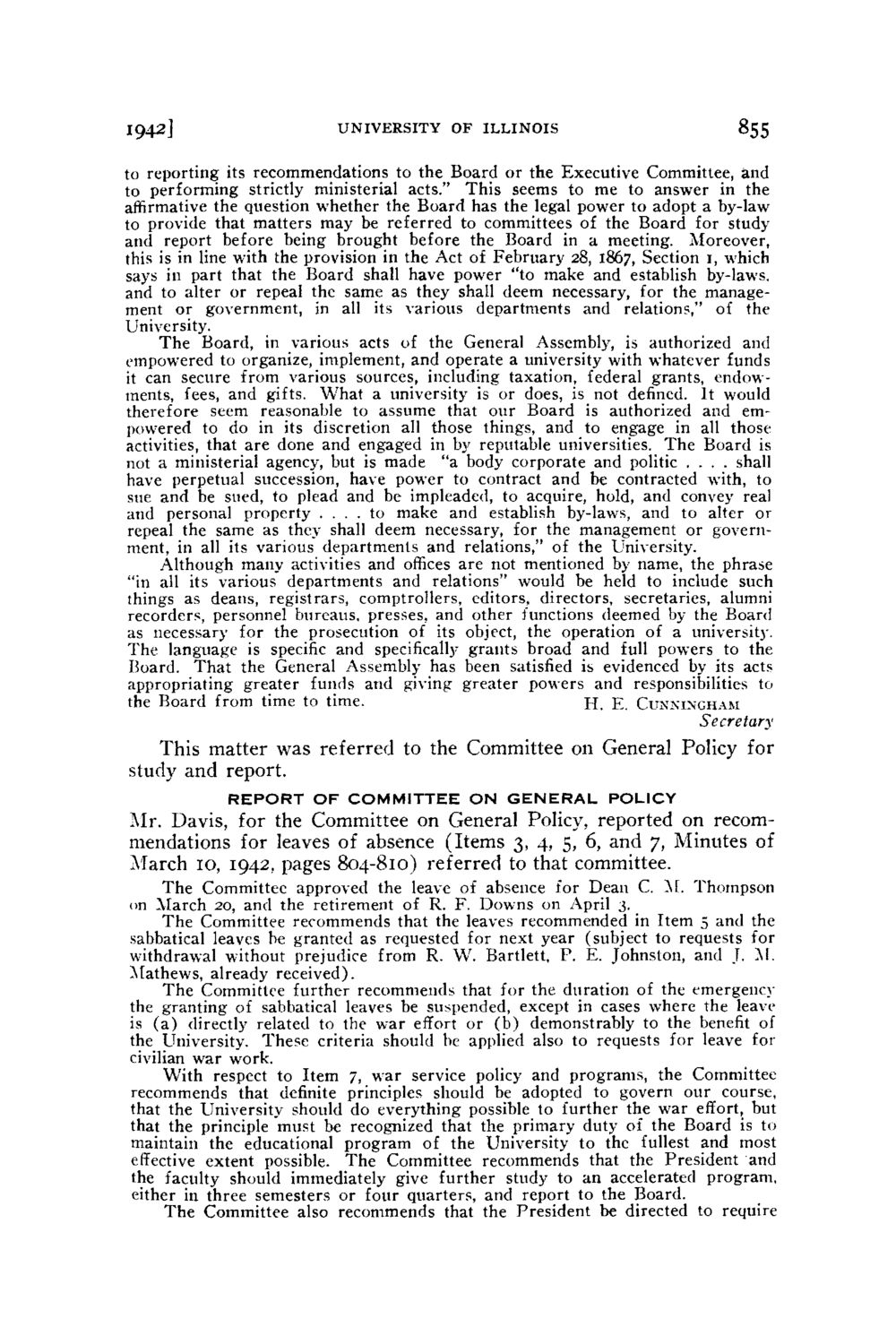| |
| |
Caption: Board of Trustees Minutes - 1942
This is a reduced-resolution page image for fast online browsing.

EXTRACTED TEXT FROM PAGE:
1942] UNIVERSITY OF ILLINOIS 855 to reporting its recommendations to the Board or the Executive Committee, and to performing strictly ministerial acts." This seems to me to answer in the affirmative the question whether the Board has the legal power to adopt a by-law to provide that matters may be referred to committees of the Board for study and report before being brought before the Board in a meeting. Moreover, this is in line with the provision in the Act of February 28, 1867, Section 1, which says in part that the Board shall have power "to make and establish by-laws. and to alter or repeal the same as they shall deem necessary, for the management or government, in all its various departments and relations," of the University. T h e Board, in various acts of the General Assembly, is authorized and empowered to organize, implement, and operate a university with whatever funds it can secure from various sources, including taxation, federal grants, endowments, fees, and gifts. W h a t a university is or does, is not defined. It would therefore seem reasonable to assume that our Board is authorized and empowered to do in its discretion all those things, and to engage in all those activities, that are done and engaged in by reputable universities. The Board is not a ministerial agency, but is made "a body corporate and politic . . . . shall have perpetual succession, have power to contract and be contracted with, to sue and be sued, to plead and be impleaded, to acquire, hold, and convey real and personal property . . . . to make and establish by-laws, and to alter or repeal the same as they shall deem necessary, for the management or government, in all its various departments and relations," of the University. Although many activities and offices are not mentioned by name, the phrase "in all its various departments and relations" would be held to include such things as deans, registrars, comptrollers, editors, directors, secretaries, alumni recorders, personnel bureaus, presses, and other functions deemed by the Board as necessary for the prosecution of its object, the operation of a university. The language is specific and specifically grants broad and full powers to the Board. That the General Assembly has been satisfied is evidenced by its acts appropriating greater funds and giving greater powers and responsibilities to the Board from time to time. H . E. CUNNINGHAM Secretary This matter was referred to the Committee on General Policy for study and report. REPORT OF COMMITTEE ON GENERAL POLICY Mr. Davis, for the Committee on General Policy, reported on recommendations for leaves of absence (Items 3, 4, 5, 6, and 7, Minutes of March 10, 1942, pages 804-810) referred to that committee. The Committee approved the leave of absence for Dean C. M. Thompson on March 20, and the retirement of R. F. Downs on April 3. The Committee recommends that the leaves recommended in Item 5 and the sabbatical leaves be granted as requested for next year (subject to requests for withdrawal without prejudice from R. W . Bartlett, P. E. Johnston, and T. M. Mathews, already received). T h e Committee further recommends that for the duration of the emergency the granting of sabbatical leaves be suspended, except in cases where the leave is ( a ) directly related to the war effort or (b) demonstrably to the benefit of the University. These criteria should be applied also to requests for leave for civilian war work. With respect to Item 7, war service policy and programs, the Committee recommends that definite principles should be adopted to govern our course, that the University should do everything possible to further the war effort, but that the principle must be recognized that the primary duty of the Board is to maintain the educational program of the University to the fullest and most effective extent possible. The Committee recommends that the President and the faculty should immediately give further study to an accelerated program, either in three semesters or four quarters, and report to the Board. T h e Committee also recommends that the President be directed to require
| |